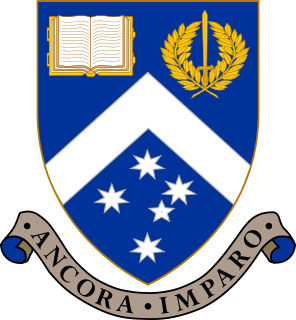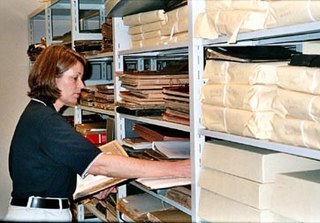
Professor Sue McKemmish is an Australian archivist and scholar in the field of archival science. She is currently the Associate Dean Graduate Research for the Faculty of Information Technology at Monash University, Melbourne. [1]

Professor Sue McKemmish is an Australian archivist and scholar in the field of archival science. She is currently the Associate Dean Graduate Research for the Faculty of Information Technology at Monash University, Melbourne. [1]
McKemmish worked for 15 years for the National Archives of Australia and Public Record Office Victoria. [2] In 1990 she joined Frank Upward at Monash University to develop a curriculum for recordkeeping professionals at undergraduate and post-graduate levels. She is best known in her discipline for her seminal paper "Evidence of me" (1996), about personal recordkeeping and societal memory. She also played a significant role in the development of records continuum thinking which led to Frank Upward's Records Continuum Model. In the 1990s she was a founding member of the Records Continuum Research Group at Monash. [3]
She is a leader of continuum thinking, particularly related to societal memory linked to accountability, and is closely associated with the Australian records continuum movement. She has published extensively on recordkeeping in society, records continuum theory, recordkeeping metadata, and archival systems, and is a Laureate of the Australian Society of Archivists. [4]
She has been at the forefront of a research and education agenda based in continuum thinking, which includes the development and leadership of international, multidisciplinary and collaborative research projects, as well as supervising multiple PhD students. She is engaged in major research and standards initiatives relating to the use of metadata in records and archival systems, information resource discovery and smart information portals, Australian Indigenous archives, and the development of more inclusive archival educational programs that meet the needs of diverse communities.
McKemmish has taken on senior leadership roles in the Faculty of Information Technology at Monash. She is the Chair of Archival Systems, Founder and Director of the Centre for Organisational and Social Informatics (COSI), and Associate Dean Graduate Research of the Faculty of Information Technology. [5] [6]

Monash University is a public research university based in Melbourne, Victoria, Australia. Named for prominent World War I general Sir John Monash, it was founded in 1958 and is the second oldest university in the state. The university has a number of campuses, four of which are in Victoria, and one in Malaysia. Monash also has a research and teaching centre in Prato, Italy, a graduate research school in Mumbai, India and graduate schools in Suzhou, China and Tangerang, Indonesia. Monash University courses are also delivered at other locations, including South Africa.

An archivist is an information professional who assesses, collects, organizes, preserves, maintains control over, and provides access to records and archives determined to have long-term value. The records maintained by an archivist can consist of a variety of forms, including letters, diaries, logs, other personal documents, government documents, sound and/or picture recordings, digital files, or other physical objects.
In archival science, a fonds is a group of documents that share the same origin and that have occurred naturally as an outgrowth of the daily workings of an agency, individual, or organization. An example of a fonds could be the writings of a poet that were never published or the records of an institution during a specific period.

Archival science, or archival studies, is the study and theory of building and curating archives, which are collections of documents, recordings and data storage devices.
The Master of Library and Information Science (MLIS), also referred to as the Master of Library and Information Studies, is the master's degree that is required for most professional librarian positions in the United States. The MLIS is a relatively recent degree; an older and still common degree designation for librarians to acquire is the Master of Library Science (MLS), or Master of Science in Library Science (MSLS) degree. According to the American Library Association (ALA), "The master’s degree in library and information studies is frequently referred to as the MLS; however, ALA-accredited degrees have various names such as Master of Information Studies, Master of Arts, Master of Librarianship, Master of Library and Information Studies, or Master of Science. The degree name is determined by the program. The [ALA] Committee for Accreditation evaluates programs based on their adherence to the Standards for Accreditation of Master's Programs in Library and Information Studies, not based on the name of the degree."

The following outline is provided as an overview of and topical guide to library science:
The Penn State College of Information Sciences and Technology, also known as the College of IST, opened in 1999 as the information school of The Pennsylvania State University. Headquartered at the University Park campus in University Park, Pennsylvania, the college's programs are offered at 21 Penn State campus locations. Dr. Andrew Sears currently serves as the college's dean.

The Monash University Faculty of Science is one of the largest science faculties in Australia, with over 4,000 students. It offers both undergraduate and postgraduate courses, from Bachelor's degrees through to Masters and PhDs. It is based at the Monash Clayton campus in Melbourne, and has extended to Selangor, Malaysia as the School of Science.
Preservation metadata is item level information that describes the context and structure of a digital object. It provides background details pertaining to a digital object's provenance, authenticity, and environment. Preservation metadata, is a specific type of metadata that works to maintain a digital object's viability while ensuring continued access by providing contextual information, usage details, and rights.
The University of Texas School of Information is a graduate school and undergraduate school at the University of Texas at Austin, offering master's and doctoral degrees in information studies, as well as certificates of advanced study and an undergraduate minor. In 2021, they began offering a bachelor's degree in informatics. UT iSchool graduates find careers in archival enterprise, information architecture, information policy, information systems design and management, information usability, librarianship, multimedia design, museum work, preservation and conservation, and records management.
Terence M. Eastwood is best known for his pioneering roles in archival education internationally and the creation of archival descriptive standards in Canada. He has published widely on a number of topics of importance to the development of archival theory and has lectured and presented throughout the world. His work supervising archival studies students helped craft a whole new generation of archivists who themselves have gone on to make important contributions to the field.
Howard Besser is a scholar of digital preservation, digital libraries, and preservation of film and video. He is Professor of Cinema Studies and the founding director of the NYU Moving Image Archiving and Preservation Program ("MIAP"), a graduate program in the Tisch School. Besser also works as a Senior Scientist at New Your University's Digital Library Initiative. He conducted extensive research in image databases, multimedia operation, digital library, and social and cultural influence of the latest Information Technology. Besser is a prolific writer and speaker, and has consulted with many governments, educational institutions, and arts agencies on digital preservation matters. Besser researched libraries' new technology, archives, and museums. Besser has been actively contributing at the international level to build metadata and upgrade the quality of the cultural heritage community. He predominantly, he focused on image and multimedia databases; digital library aspects ; cultural and societal impacts of information technology, and developing new teaching methods through technology such as web-based instructions and distance learning. Besser was closely involved in development of the Dublin Core and the Metadata Encoding and Transmission Standard (METS), international standards within librarianship.

The records continuum model (RCM) is an abstract conceptual model that helps to understand and explore recordkeeping activities. It was created in the 1990s by Monash University academic Frank Upward with input from colleagues Sue McKemmish and Livia Iacovino as a response to evolving discussions about the challenges of managing digital records and archives in the discipline of archival science.
Elizabeth Yakel is an archivist, researcher, and educator in information science. Yakel is known for work advancing archival practice, the use of primary sources in archives education, studies of data reuse practices, and digital curation. Yakel is the Senior Associate Dean for Academic Affairs and a Professor at the University of Michigan School of Information, where she has been on the faculty since 2000. She is the former coordinator of the Preservation of Information specialization in the Master of Science in Information program and teaches in the Archives and Record Management area. She specializes in digital archives and digital preservation and has developed five such graduate level courses at UM, including "Economics of Sustainable Digital Information" and "Practical Engagement Workshop in Digital Preservation."
Heather MacNeil is a professor at the Faculty of Information of the University of Toronto, Canada. She teaches archives and record keeping related topics. She is a former General Editor of Archivaria (2014-2015) and helped develop the concept of the Archival bond.
Bachelor of Business Information Systems (BBIS) is an IT focused undergraduate program designed to better understand the needs of business and industry and be well equipped to meet those needs. It blends core concepts from a traditional business administration degree and a technology related degree.

Helen Ruth Tibbo is an American archivist, professor and author writing about digital preservation in the archival profession. At the University of North Carolina, she created and directed the first American master's degree on digital curation. She is a past President of the Society of American Archivists
Anne Jervois Gilliland is an archivist, scholar, and professor in the field of archival studies. She is Associate Dean for Information Studies at the University of California, Los Angeles Graduate School of Education & Information Studies.
Elizabeth 'Liddy' Nevile is an Australian academic and a pioneer in using computers and the World Wide Web for education in Australia. In 1989-1990 she was instrumental in establishing the first program in the world that required all students to have laptop computers, at Methodist Ladies College, Melbourne, Australia.
Adrian Cunnningham is an Australian archivist who worked for many years at the National Archives of Australia. He is known for his contributions to the practice of digital records management, including development of international standards in this field.